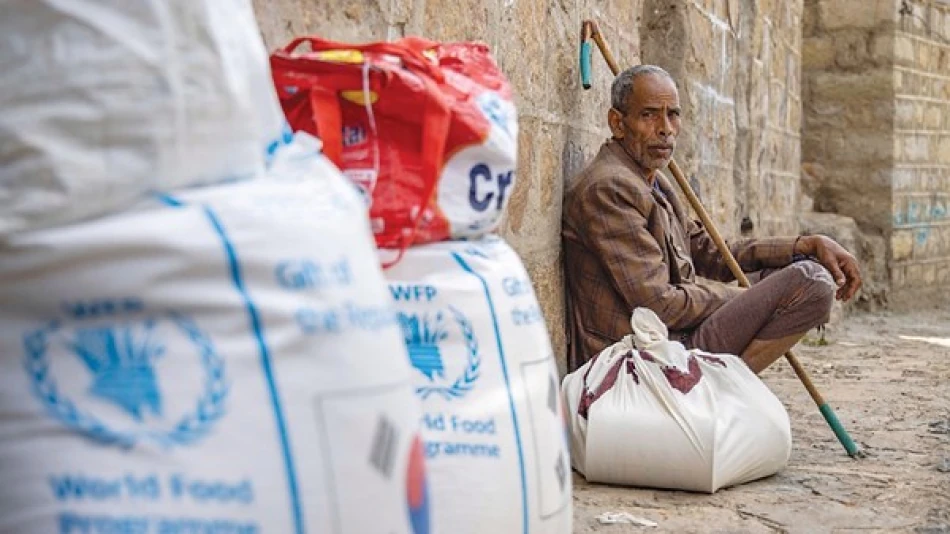
World Food Program Continues Vital Operations in Yemen Despite Challenges
Houthis Escalate Humanitarian Crisis by Detaining UN Workers in Yemen
Yemen's Houthi militia has intensified its systematic campaign against international humanitarian operations by detaining 19 UN staff members in late August, bringing the total number of UN personnel held in their custody to 25 since 2021. This calculated escalation threatens to cripple aid delivery to one of the world's worst humanitarian crises, where millions depend on international assistance for survival.
Strategic Targeting of International Aid Operations
On August 31, Houthi forces raided UN offices in Sanaa and Hodeidah, seizing personnel from the World Food Programme and UNICEF. According to some reports, the total number of detained international workers may exceed 30 following the latest raids. This represents the most significant detention of UN staff in Yemen's ongoing conflict.
Abdullah Al-Wardat, Special Envoy of the World Food Programme in Yemen, confirmed that operations would continue despite these "difficult circumstances," though the detentions inevitably strain the organization's capacity to deliver aid to Yemen's 21 million people requiring humanitarian assistance.
Pattern of Systematic Intimidation
Ahmed Arman, Yemen's Human Rights Minister, characterized the detentions as part of a systematic policy designed to restrict humanitarian work and exert political pressure on the international community. The Houthis previously conducted similar detention campaigns in 2023, targeting UN personnel and international civil organizations.
"This targeting primarily aims to undermine the independence of their work and blackmail humanitarian organizations regarding aid files," Arman stated, emphasizing that such actions violate international humanitarian law and agreements protecting humanitarian workers.
Broader Implications for Regional Stability
Humanitarian Access Under Siege
The detentions represent more than isolated incidents—they signal a deliberate strategy to weaponize humanitarian aid. By holding UN workers hostage, the Houthis gain leverage over aid distribution while potentially diverting resources to support their military operations. This tactic mirrors strategies employed by other militant groups globally, from Afghanistan to Syria, where humanitarian access becomes a bargaining chip.
International Response Challenges
The international community faces a complex dilemma: maintaining humanitarian operations while avoiding legitimizing hostage-taking. Previous negotiations have stalled due to Houthi demands for selective prisoner exchanges rather than comprehensive "all-for-all" arrangements proposed by Yemen's internationally recognized government.
Minister Arman revealed that the government has repeatedly offered concessions to secure releases, particularly for vulnerable detainees including elderly individuals, patients, and journalists. However, Houthi insistence on selective exceptions undermines any agreement's humanitarian essence.
Economic and Strategic Calculations
The timing of these detentions coincides with broader regional tensions and suggests the Houthis view international workers as valuable assets in their confrontation with the Saudi-led coalition. Control over humanitarian operations provides both financial leverage and international attention—two commodities crucial for the Iran-backed group's survival strategy.
Unlike previous conflicts where humanitarian neutrality was generally respected, Yemen's war has seen systematic targeting of aid operations by multiple parties. The Houthis' approach, however, stands out for its calculated nature and direct challenge to international humanitarian principles.
Path Forward Remains Uncertain
The detention crisis exposes fundamental weaknesses in international mechanisms for protecting humanitarian workers in active conflict zones. While the UN Security Council and various international bodies have condemned the detentions, enforcement mechanisms remain limited when dealing with non-state actors like the Houthis.
The situation demands immediate international pressure for unconditional releases, but also raises longer-term questions about humanitarian operations in environments where neutrality offers no protection. Yemen's crisis may force a recalibration of how international organizations operate in similar conflicts worldwide, potentially requiring enhanced security protocols that could reduce aid effectiveness.
As Yemen enters its tenth year of conflict, the weaponization of humanitarian aid through worker detention represents a dangerous precedent that extends far beyond the country's borders, threatening the fundamental principles underlying international humanitarian response globally.
Most Viewed News

 Layla Al Mansoori
Layla Al Mansoori






